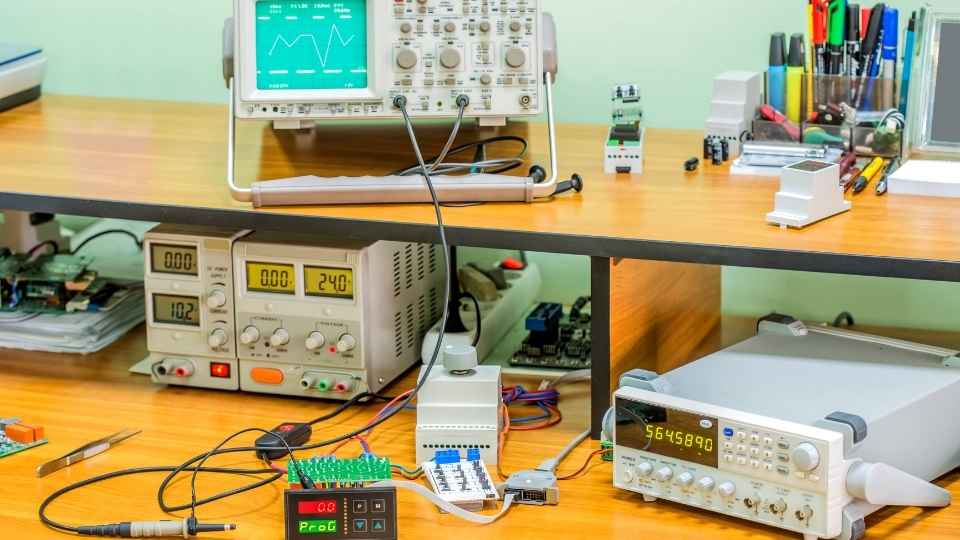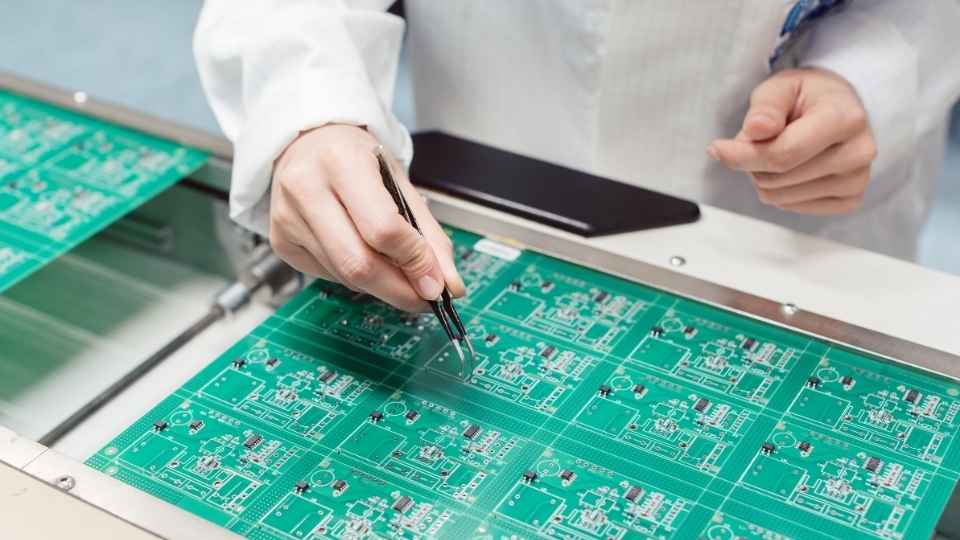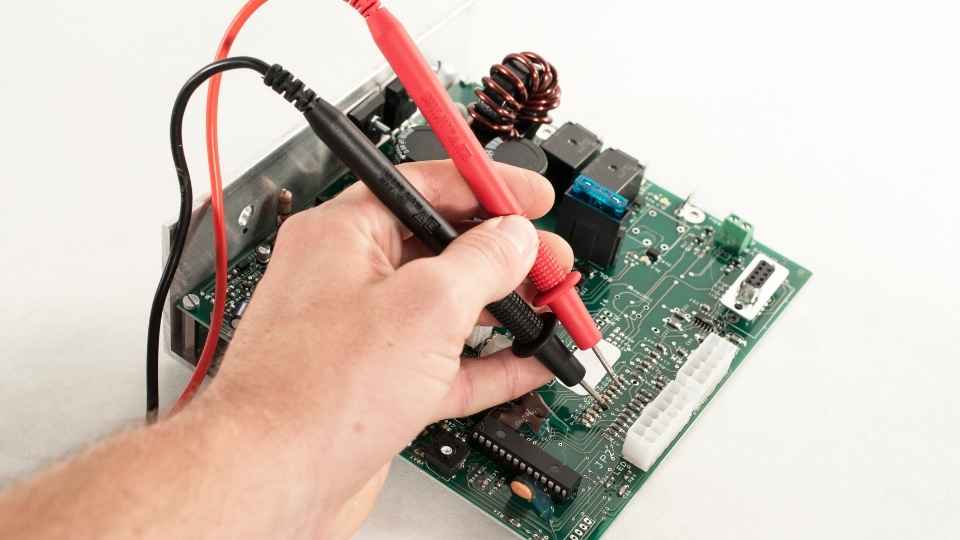
In a world where the demand for energy is ever-increasing, the efficient regulation and storage of power have become paramount.
Enter power electronics – the field that combines electrical engineering with advanced electronic devices to optimize energy usage.
In this article, we delve into the intricacies of efficiently regulating and storing energy in power electronics systems.
From voltage regulators to converters and inverters, we explore the technical aspects of these devices and their applications.
Join us on this analytical journey as we uncover strategies for maximizing energy efficiency in a world yearning for freedom from wastefulness.
Key Takeaways
- Efficient energy regulation in power electronics is important for optimizing the performance and sustainability of energy storage systems.
- Voltage regulators ensure stable output voltage regardless of input variations, with linear regulators being less efficient but simpler, and switching regulators offering higher efficiency but increased complexity.
- Converters and inverters play a crucial role in energy conversion processes, ensuring compatibility between different energy sources and loads.
- Power factor correction techniques, such as passive or active filters and advanced control algorithms, improve power utilization efficiency by minimizing reactive power and harmonics.
The Importance of Efficient Energy Regulation in Power Electronics
Efficient energy regulation in power electronics plays a crucial role in optimizing the performance and sustainability of various energy storage systems. Power electronics is the technology that controls and converts electrical power, allowing it to be efficiently used, stored, and distributed.
Energy regulation refers to the process of maintaining a stable flow of electricity within desired limits. This is essential for ensuring that energy storage systems operate at their maximum efficiency, reducing waste and minimizing environmental impact.

Effective energy regulation involves precise control over voltage, current, and frequency. It allows for seamless integration of renewable energy sources into existing power grids, enabling the efficient utilization of clean energy resources. Furthermore, by regulating the flow of electricity, power electronics ensures the safe operation of devices connected to the grid.
Understanding voltage regulators: types and applications will further explore how different types of voltage regulators are utilized in power electronics to achieve efficient energy regulation and enable reliable operation across various industries.
Understanding Voltage Regulators: Types and Applications
Voltage regulators are essential components in electronic systems as they ensure a stable output voltage regardless of input variations. Understanding their types and applications is crucial for efficient power management.
There are several types of voltage regulators commonly used in power electronics. These include linear regulators, switching regulators, and programmable regulators.
Linear regulators operate by dissipating excess energy as heat, making them simple but less efficient. Switching regulators, on the other hand, use high-frequency switches to control the voltage output. This offers higher efficiency but comes at the expense of increased complexity.
Programmable regulators provide flexibility by allowing users to adjust the output voltage through digital interfaces.
Voltage regulators find applications in various industries such as telecommunications, automotive, consumer electronics, and renewable energy systems. By maintaining a constant voltage level despite fluctuations in input power sources or loads, these devices ensure reliable operation of electronic circuits and optimize overall system performance.

Exploring Converters and Inverters for Efficient Energy Conversion
One of the key components in energy conversion systems, converters and inverters play a critical role in converting electrical energy from one form to another, enabling seamless integration of renewable sources into the grid.
Here are three important aspects of converters and inverters:
Functionality: Converters are used to change the voltage, current, or frequency of electrical energy, while inverters convert DC power into AC power. Both devices ensure compatibility between different energy sources and loads.
Efficiency: The efficiency of converters and inverters is crucial for optimizing energy conversion processes. Higher efficiency reduces losses during conversion, resulting in maximum utilization of available resources.
Control Mechanisms: Advanced control techniques are employed to regulate the output characteristics of converters and inverters. These mechanisms ensure stable operation, accurate voltage regulation, and protection against faults or disturbances.
By understanding these aspects, engineers can design efficient energy conversion systems that contribute to a sustainable future with increased reliance on renewable sources.
Transitioning into the next section about power factor correction allows us to explore another aspect of optimizing energy efficiency in power electronics.

Power Factor Correction: Optimizing Energy Efficiency in Power Electronics
The optimization of power factor correction is essential in enhancing the overall performance and reliability of electrical systems. Power factor is a measure of how effectively electrical power is being utilized. In power electronics, it refers to the ratio between real power (useful power) and apparent power (total power).
A low power factor leads to inefficiencies in energy consumption, resulting in increased electricity costs and potential equipment damage. To address this issue, various techniques have been developed to improve power factor correction, such as the use of passive or active filters, resonant converters, and advanced control algorithms. These methods aim to minimize reactive power and harmonics, improving system efficiency while maintaining stable operation.
By optimizing power factor correction, electrical systems can achieve higher energy efficiency and reduce their environmental impact.
Transitioning into the subsequent section about 'modern energy storage solutions for power electronics', effective management of electrical energy requires not only efficient utilization but also reliable storage options for excess energy.
Modern Energy Storage Solutions for Power Electronics
Effective management of excess electrical power in power electronics necessitates the implementation of cutting-edge storage solutions that can reliably accommodate and distribute surplus energy as needed.
With advancements in technology, modern energy storage solutions have emerged to address this challenge. Here are three key solutions:
Lithium-ion Batteries: These high-energy density batteries offer fast charging and discharging capabilities, making them ideal for power electronics applications. They provide reliable and efficient energy storage, enabling smooth operations during peak demand periods.

Supercapacitors: These devices store energy electrostatically and can deliver high power output rapidly. They are suitable for short-term energy storage in power electronics systems where quick bursts of energy are required.
Flywheel Energy Storage: This solution utilizes a spinning rotor to store kinetic energy, which can be converted back into electricity when needed. Flywheels provide continuous power supply, making them suitable for applications where uninterrupted operation is critical.
Strategies for Efficient Energy Management in Power Electronics Systems
Efficient energy management is crucial in power electronics systems to optimize the utilization of available resources and maximize overall system performance.
Various strategies can be employed to achieve efficient energy management, which involves minimizing energy losses and ensuring optimal use of stored energy.
One strategy is to implement advanced control algorithms that regulate the power flow within the system. These algorithms enable precise monitoring and adjustment of voltage and current levels, ensuring that energy conversion processes are carried out with minimal losses.
Another strategy involves incorporating energy storage devices such as batteries or capacitors into the system. These storage devices can be charged during times of low demand and discharged during peak periods, reducing reliance on external power sources and allowing for a more efficient distribution of energy.
Furthermore, implementing intelligent power management systems that prioritize load requirements based on their criticality can also contribute to efficient energy management. This approach ensures that essential loads receive the necessary supply while non-critical loads are temporarily reduced or switched off, optimizing overall system efficiency.

Frequently Asked Questions
What Are the Potential Drawbacks or Limitations of Using Voltage Regulators in Power Electronics?
Potential drawbacks or limitations of using voltage regulators in power electronics include inefficiency due to heat dissipation, limited voltage range, and potential for electromagnetic interference. These factors can impact overall system performance and reliability.
How Does Power Factor Correction Impact the Overall Efficiency of Power Electronics Systems?
Power factor correction is a critical aspect in power electronics systems, impacting overall efficiency. It ensures that the current waveform aligns with the voltage waveform, reducing reactive power and improving power transfer efficiency.
Are There Any Emerging Technologies or Advancements in Energy Storage That Could Revolutionize Power Electronics?
Emerging technologies and advancements in energy storage have the potential to revolutionize power electronics. These developments could enhance efficiency, reliability, and scalability, enabling more efficient regulation and storage of energy in power electronics systems.
What Are Some Common Challenges Faced in Managing and Optimizing Energy Efficiency in Power Electronics Systems?
What are the common challenges in managing and optimizing energy efficiency in power electronics systems? Achieving maximum efficiency, minimizing losses, ensuring reliable operation, and integrating renewable energy sources pose significant hurdles in this field.
Can You Provide Examples of Specific Applications or Industries Where Efficient Energy Regulation in Power Electronics Is Particularly Critical?
Efficient energy regulation in power electronics is crucial in various applications and industries. Examples include electric vehicles, renewable energy systems, data centers, and smart grids. Optimizing energy efficiency enhances performance, reduces costs, and minimizes environmental impact.
 Basic Electronics ConceptsEssential ToolsCircuit Design BasicsMicrocontrollersDIY Electronics ProjectsRoboticsPrivacy PolicyTerms And Conditions
Basic Electronics ConceptsEssential ToolsCircuit Design BasicsMicrocontrollersDIY Electronics ProjectsRoboticsPrivacy PolicyTerms And Conditions
